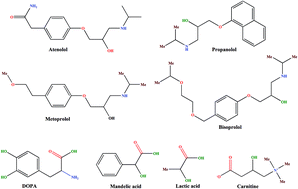Indirect chiral ligand exchange chromatography for enantioseparation: a modification of conventional techniques†
Abstract
Indirect chiral ligand exchange chromatography (ICLEC) was facilitated by substituting chiral ligands from the bidentate Cu(II) complex via racemic analytes in reaction vial. In-vial ligand exchange does not require the potentially harmful Cu(II)-containing mobile phase for HPLC separation, as it facilitates better pH control for improved complexation of enantiomers with the chiral Cu(II)–ligand complex. Resulting Cu(II)–analyte–ligand complexes have higher stability constants and show better chromatographic resolution than conventional (CLEC). The new technique also eliminates background noise, a problem with conventional CLEC due to higher concentrations of Cu-containing selector due to the Cu-free mobile phase. The new technique was found successful in determining enantiomeric purity of drugs in pharmaceutical formulations. The technique can be regarded as a novel surrogate for conventional CLEC and has the potential for biological and pharmaceutical applications.


 Please wait while we load your content...
Please wait while we load your content...